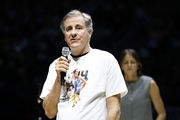
Imago
Credits: IMAGO

Imago
Credits: IMAGO
“The only thing he could beat me at is a horseback ride!” said four-weight world champion Terence Crawford ahead of his fight with Canelo Alvarez. This Saturday in Las Vegas, Crawford is challenging Canelo (63-2-2, 39 KOs), the undisputed WBC, WBA, WBO, and IBF super middleweight champ. But don’t count Crawford out just yet—commentators have been going off like a broken record about his “defective” mindset, and that might just make this fight even more interesting.
Watch What’s Trending Now!
Ahead of the big fight, the commentator, Max Kellerman, didn’t hold back in praising Terence Crawford, comparing his competitive drive to none other than Michael Jordan. “He’s athletic, he has long arms, he has punching power, he has speed—all those things. He has a very high boxing IQ, but the defining characteristic of Crawford to me as an athlete is he has a defective competitive personality, defective, competitive. The other athlete that comes to mind is Michael Jordan. Bud Crawford wants to beat you at everything all the time and he competes against everyone…”
Crawford’s record backs up that praise. CBS Sports ranks him as the No. 4 pound-for-pound boxer, and he’s undefeated at 41-0 with 31 knockouts. He’s 19-0 with 15 KOs in world title fights, boasting a 76% knockout rate, and his bouts average just six rounds. In fact, he’s won 14 of his last 16 fights by knockout, proving that his “defective” competitive edge isn’t just talk—it’s results inside the ring.
ADVERTISEMENT
“The other athlete that comes to mind is Michael Jordan.”
Max Kellerman with the highest praise for Terence Crawford, comparing his competitive drive as an athlete to the 🐐 Michael Jordan.#CaneloCrawford
LIVE tonight ONLY on Netflix
Saturday, September 13
9 PM ET | 6 PM PT pic.twitter.com/NXqNqlNmDU— Netflix Sports (@netflixsports) September 13, 2025
The Bulls knew they had a special talent when they drafted Michael Jordan in 1984. Coaches built unique strategies to prepare him physically and mentally for the NBA grind. That prep laid the foundation for a career that redefined basketball, and Jordan delivered—winning titles with the Bulls and going 6-0 in the Finals. He was never satisfied with being good or great; he always wanted to be the best.
“We train to be the best at what we do. And sometimes, to be the best, you gotta step on people,” Jordan said. “Not step on, literally, but I mean, in terms of winning and dominating.”
ADVERTISEMENT
MJ said to his friend, Ahmad Rashad, describing his mindset and approach to dominating on the court. He explained that to be the best, sometimes you have to make tough choices and push harder than others, metaphorically “stepping on people” in terms of winning and dominating, not literally.
The commentator explained Crawford’s fear, saying, “Are you scared of anything? And he said only thing he’s scared of is his mother…him. I think the thing he’s actually scared of is his mother telling him his whole life, you’re not gonna be anything. Even when he succeeds, he’s scared of her beating him. Yeah, if he fails, she wins.”
ADVERTISEMENT
Top Stories
Jaxson Hayes vs Mascot: Everything You Need to Know About the Entire Episode of Altercation, Suspension and More

“Forgot He Plays Basketball”: NBA Legend Blasts Warriors’ Kristaps Porzingis Trade Amid Jimmy Butler Rumor

Fever Ownership Nowhere on Sophie Cunningham’s “Most Involved” WNBA List

LeBron James-Steph Curry Team-Up Gets Major Boost After Warriors’ Kristaps Porzingis Trade

Crisis Deepens for Chicago Owner as Mismanagement Pulls in Investors, City Officials

Both Terence Crawford’s and Michael Jordan’s stories reveal how the foundations of greatness are often laid in the crux of family influence, though expressed through different dynamics of love and expectation. Crawford’s mother, Debbie, forged his spirit with tough love, using unorthodox methods—like staging neighborhood fights—to sharpen his edge and test his will. In her own way, she demanded that he prove himself, instilling a relentless drive to conquer every obstacle. For Crawford, triumph wasn’t just about winning in the ring, but about validating his worth to the very person who pushed him hardest.
Jordan’s path was shaped less by collision and more by guidance. His father, James, provided support, wisdom, and direction, becoming a steady compass in his life. Their bond was a grounding force, and Jordan’s competitive fire was fueled by the desire to honor and make his father proud. When his father’s life was tragically cut short, Michael’s grief redirected him into seeking new ways to pay tribute—like stepping into baseball, a sport his father loved.
Jordan learned to thrive on these challenges and credited his first coach, Kevin Loughery, for shaping his competitive mindset. Practices weren’t just routine—they were designed to test him. Coaches would switch him to the losing team in the middle of a scrimmage, even when he was dominating, to see how he handled it. As Roland Lazenby put it, Jordan got “infuriated by this… the angrier he got, the harder he played,” and that fire only made him stronger.
ADVERTISEMENT
He recalled how Loughery made practices competitive, forcing the losing team to run, and said he saw it as a personal test: a way to push him to his limits. Every challenge became fuel, building a drive to always improve and dominate.
The pressure of perfection: How MJ’s competitiveness fueled himself
Michael Jordan’s drive to be the best didn’t stop on the court—it infiltrated every part of his life. From playing Sudoku on his iPad to casual competitions, he wanted to win at everything, constantly testing himself. As ESPN analyst Wright Thompson observed while spending time with MJ before his 50th birthday, this competitiveness wasn’t just a quirk—it was an addiction that brought immense pressure.
Jordan himself admitted, “I can’t help myself. It’s an addiction. You ask for this special power to achieve these heights, and now you got it and you want to give it back, but you can’t. If I could, then I could breathe.” This relentless drive defined him, but it also created a weight that only he truly understood.
Throughout his career, MJ often pushed his teammates to their limits, sometimes harshly, because he expected the same level of intensity from everyone around him that he demanded of himself. Steve Kerr recalled that Jordan and Scottie Pippen’s conversations in practice were “frequently heated,” showing how the competitive fire extended to every interaction.
Even with six NBA championships and Finals MVPs, Jordan’s perfectionism sometimes became a burden, straining relationships with teammates and casting a shadow over his own achievements. Yet, beneath this intensity was a deep understanding that his relentless standards were part of what made him excel.
Despite the pressure he placed on himself, Jordan embraced failure as part of the process. He reflected, “I’ve missed more than 9,000 shots in my career. I’ve lost almost 300 games. 26 times, I’ve been trusted to take the game winning shot and missed. I’ve failed over and over and over again in my life. And that is why I succeed.” His own competitiveness, while exhausting, was inseparable from his success—proof that even the greatest athletes are human, and their triumphs are built as much on mental battles as physical ones.
ADVERTISEMENT
ADVERTISEMENT
ADVERTISEMENT
ADVERTISEMENT